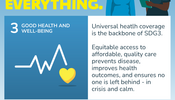
The 2025 UHC Day campaign launches with the theme “Unaffordable health costs? We’re sick of it!”
8th October 2025

UHC2030, the Civil Society Engagement Mechanism (CSEM) and the Coalition of Partnerships for UHC and Global Health launched the 2025 UHC Day campaign with the theme “Unaffordable health costs? We’re sick of it!”
On 7 October 2025, UHC2030, the Civil Society Engagement Mechanism (CSEM) for UHC2030, and the Coalition of Partnerships for UHC and Global Health (the Coalition) launched the 2025 Universal Health Coverage (UHC) Day campaign with a 90-minute webinar focused on the urgent need to address unaffordable health costs, particularly for the most vulnerable.
More than half the world’s population still lacks access to essential health services. And a quarter of them face financial hardship when paying for health care out of their own pockets, often at the expense of food, education or housing.
The 2025 campaign theme, “Unaffordable health costs? We’re sick of it!”, focuses on the lived experience behind these statistics, reminding government decision-makers that unaffordable health costs are making our communities poorer and sicker and holding us back on all of the Sustainable Development Goals.
Dr. Pamela Cipriano, co-chair of the UHC2030 Steering Committee, provided opening remarks. Referring to the current global context of rising conflicts, severe health financing challenges, widening inequality, climate shocks and pressure on all health systems, she highlighted the “room for optimism, to turn these pressures into action”, framing UHC as a means of increasing equity, justice and inclusion. Dr. Cipriano also spoke about the need to challenge the status quo and to act decisively to accelerate progress towards UHC so that everyone can access the care they need, when they need it, without financial hardship.
Building on this messaging, UHC2030 then shared the 2025 UHC Day campaign materials, which include:
- Campaign graphics with ready-to-use social media posts
- Calls-to-actions for decision-makers, with advocacy templates for letters, statements and media releases
- Instructions to engage in the #HealthCostsHurt campaign, to raise awareness of the human faces behind the numbers and urge decision-makers to prioritize financial protection for health
- A UHC Day Updates series on Substack for practical tips to promote social participation for health and prepare a UHC campaign
- Tips on how to amplify the campaign and adapt it according to different contexts and priorities
The team then projected a few examples of #HealthCostsHurt video submissions, after which Amy Boldosser-Boesch, Senior Director, Management Sciences for Health and CSEM for UHC2030 Secretariat, moderated a panel discussion with the following members of the Coalition:
- Alison Cox, Policy and Advocacy Director of the NCD Alliance
- Pritha Chakraborty, Core team member, Women in Global Health (India)
- Jaime Atienza Azcona, Director, Equitable Financing, UNAIDS
- Ilze Kalnina, Lead for Political Advocacy, PMNCH
- Kana Halić Kordi, Vice-President for External Affairs, IFMSA
- Dr. Mengistu Asnake Kibret, Senior Country Director, Pathfinder International and CSEM AG member
Sharing examples of lived experiences within their work, the panelists illustrated the impact of inadequate financial protection, underscoring how out-of-pocket costs hinder access to health care and undermine progress across all health priorities.
During the audience Q&A, in response to a few questions about how advocates can hold leaders to account and monitor progress in their countries, Dr. Pamela Cipriano spoke about the upcoming Global UHC Action Tracker (ACT for UHC, formerly known as The State of Commitment to UHC), which will allow advocates to highlight achievements, identify gaps and drive evidence-based decision-making.
Dr. Magda Robalo, co-chair of the UHC2030 Steering Committee, then provided closing remarks, stating that the panel discussion illustrated how “universal health coverage brings us all under one umbrella, moving beyond disease-specific silos.” Speaking from her experience as a former Minister of Health, she described the pain of seeing the people she served struggling to access services, adding that “when care is unaffordable, people delay treatment, risk longer-term illnesses and place additional strain on social support systems.”
Dr. Robalo ended her remarks by sharing a few examples of the economic and social benefits of protecting people from unaffordable health costs, calling on government decision-makers to listen to communities, to civil society, and especially to those most affected by health costs, in order to ensure that health systems meet the real needs of people. She also highlighted the critical role advocates can play in amplifying these voices.
Did you miss the event? Click on the video below to watch the recording.


